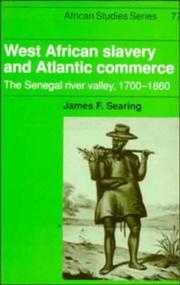| Listing 1 - 2 of 2 |
Sort by
|
Book
ISBN: 0521596785 0521593247 051158413X 0511087179 0521566785 9780521596787 9780521593243 9780511584138 Year: 1998 Volume: 94 Publisher: Cambridge Cambridge University Press
Abstract | Keywords | Export | Availability | Bookmark
 Loading...
Loading...Choose an application
- Reference Manager
- EndNote
- RefWorks (Direct export to RefWorks)
Martin Klein's book is a history of slaves during the nineteenth and twentieth centuries in three former French colonies. It investigates the changing nature of local slavery over time, and the evolving French attitudes towards it, through the phases of trade, conquest and colonial rule. The heart of the study focuses on the period between 1876 and 1922, when a French army composed largely of slave soldiers took massive numbers of slaves in the interior, while in areas near the coast, hesitant actions were taken against slave-raiding, trading and use. After 1900, the French withdrew state support of slavery, and as many as a million slaves left their masters. A second exodus occurred after World War I, when soldiers of slave origin returned home. The renegotiation of relationships between those who remained and their masters carries the story into the contemporary world.
Sociology of work --- History of Africa --- West Africa --- Slavery --- History --- #SBIB:93H3 --- #SBIB:96G --- #SBIB:327.4H21 --- #SBIB:AANKOOP --- Thematische geschiedenis --- Geschiedenis van Afrika --- Kolonisatie / dekolonisatie / post-kolonisatie --- History. --- Abolition of slavery --- Antislavery --- Enslavement --- Mui tsai --- Ownership of slaves --- Servitude --- Slave keeping --- Slave system --- Slaveholding --- Thralldom --- Crimes against humanity --- Serfdom --- Slaveholders --- Slaves --- Arts and Humanities --- Slavery - Africa, French-speaking West - History --- Slavery - Senegal - History --- Slavery - Guinea - History --- Slavery - Mali - History --- Enslaved persons

ISBN: 0521440831 0521534526 0511572786 9780521440837 9780511572784 9780521534529 Year: 1993 Volume: 77 Publisher: Cambridge Cambridge University Press
Abstract | Keywords | Export | Availability | Bookmark
 Loading...
Loading...Choose an application
- Reference Manager
- EndNote
- RefWorks (Direct export to RefWorks)
West African societies were transformed by the slave trade, even in regions where few slaves were exported. While many books have been written on the import and export trade and on warrior predation, Dr Searing's concern is with the effects of the Atlantic slave trade on the societies of the Senegal river valley in the eighteenth century. He shows that the growth of the Atlantic trade stimulated the development of slavery within West Africa. Slaves worked as seamen in the river and coasting trades, produced surplus grain to feed slaves in transit, and sometimes came to hold pivotal positions in the political structure of the coastal kingdoms of Senegambia. This local slave system had far-reaching consequences, leading to religious protest and slave rebellions. The changes in agricultural production fostered an ecological crisis.
World history --- anno 1700-1799 --- anno 1800-1899 --- Senegal --- Slave-trade --- Slavernij--(algemeen) --- 326 Slavernij--(algemeen) --- Slavery --- 326 --- Abolition of slavery --- Antislavery --- Enslavement --- Mui tsai --- Ownership of slaves --- Servitude --- Slave keeping --- Slave system --- Slaveholding --- Thralldom --- Crimes against humanity --- Serfdom --- Slaveholders --- Slaves --- History --- Sinighāl --- Territoire du Sénégal --- Gouvernement du Sénégal --- Republic of Senegal --- République du Sénégal --- Gouvernement de la République du Sénégal --- Saaxle Senegaal --- Réewum Senegaal --- Republiek van Senegal --- سنغال --- Republica de Senegal --- Rèpublica du Sènègal --- Seneqal --- Seneqal Respublikası --- Сенегал --- Senehal --- Рэспубліка Сенегал --- Rėspublika Senehal --- Republik Senegal --- Republika Senegal --- República del Senegal --- Senegalská republika --- Gweriniaeth Sénégal --- Senegali Vabariik --- Σενεγαλη --- Senegalē --- Δημοκρατια της Σενεγαλης --- Dēmokratia tēs Senegalēs --- セネガル --- Senegaru --- French Sudan --- Sudanese Republic --- Mali --- Mali Federation --- Africa, French-speaking West --- Commerce --- History. --- Slave trade --- Arts and Humanities --- Slave-trade - Senegal - History. --- Slavery - Senegal - History. --- Enslaved persons
| Listing 1 - 2 of 2 |
Sort by
|

 Search
Search Feedback
Feedback About UniCat
About UniCat  Help
Help News
News